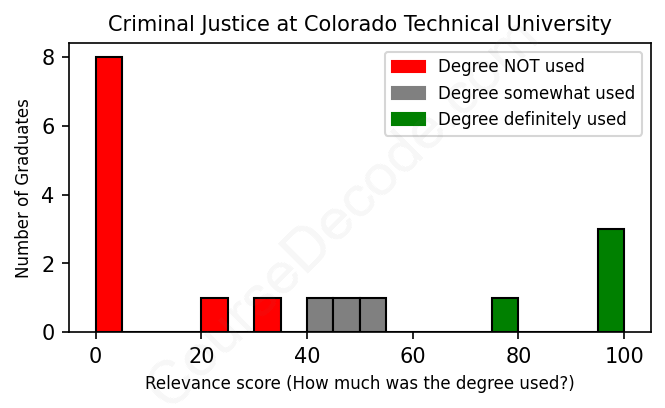
First, some facts. Of the Criminal Justice graduates from Colorado Technical University we've analyzed , here's how many have used (or NOT used) their degree in their career:

These are estimates based on AI analysis of 17 LinkedIn profiles (see below).
The verdict? Horrible! Overall, with an average relevance score of 33%, Criminal Justice graduates from Colorado Technical University have an exceptionally lower likelihood (-34%) of finding work in this field compared to the average graduate across all fields:
And for comparison, here's the chart for all profiles we've looked at across all degrees.
Also, after graduating, 47% of these graduates have pursued further education other than another Bachelor's degree (such as a Masters degree or other), compared to the average across all profiles of 35%. This suggests you may need more than just a Bachelors degree to be competitive as a Criminal Justice graduate.
See the details:
|
Relevance score: 3% We think this person has NOT gone into a career related to their degree. We think this person has NOT gone into a career related to their degree.
DEGREE INFOGraduated in 2013 from Colorado Technical University with a Bachelor of Science (BS) in Criminal Justice. No other secondary education since. JOB HISTORY SINCE GRADUATIONSite Supervisor G4S Apr 2014 - Nov 2014 Correctional Officer  Champaign County Nov 2014 - Jan 2015 Interim Supervisor  State Farm Apr 2018 - Aug 2018 Life/Health New Bussiness & Service Underwriter  State Farm Apr 2015 - Nov 2019 Life/Health Underwriter  COUNTRY Financial Nov 2019 - Aug 2021 Senior Associate Life Underwriter  New York Life Insurance Company Apr 2022 - Oct 2022 Manager Underwriting Strategy & Analytics  CNO Financial Group Oct 2022 - Oct 2023 Underwriting Manager  Symetra Oct 2023 - Present ABOUTAt Symetra, my focus as Underwriting Manager involves spearheading a team dedicated to delivering top-tier service to clients and partners. Our team's success is rooted in applying advanced insurance operations and management practices, ensuring efficient risk assessment and process optimization. With certifications in Agile methodologies and performance management, I leverage these competencies to enhance our operational framework and customer engagement.Leadership is about fostering an environment where transparency, inclusivity, and swift problem resolution are paramount. My approach involves empowering the underwriting team through constructive feedback and mentorship, aligning with our collective goal of continuous improvement. Collaboratively, we strive to surpass industry standards, creating a dynamic work culture that thrives on innovation and excellence in service. |
The top 10 most common jobs done by the graduates we've analyzed (ranked most common to least) are:
When looking at the career paths of people who graduated with a Criminal Justice degree from Colorado Technical University, a pretty clear trend emerges. Most of them have taken on roles that don't directly tie back to Criminal Justice, like executive assistants, administrative positions, and roles in retail management. For instance, many professionals end up in jobs such as executive assistants or in administrative support roles in corporations, which don't necessitate knowing about criminal justice principles. Even positions like Engagement Manager or Accounts Receivable Specialist keep them far from any law enforcement or legal responsibilities. On the surface, these jobs might seem stable, but they certainly don't reflect the skills and knowledge gained from their studies in Criminal Justice.
However, some individuals have managed to secure positions that are highly relevant to their degree. For instance, jobs like Correctional Officer, Lieutenant in law enforcement, or roles as Correctional Unit Supervisors are explicitly tied to the skills learned in a Criminal Justice program. These positions require a solid understanding of the legal system and the principles of law enforcement, utilizing the knowledge these graduates acquired during their studies. Overall, while a portion of graduates did find relevant employment in the field, many drifted into unrelated sectors, indicating a bit of a disconnect between their education and their job choices. It's definitely something for future Criminal Justice students to consider when they think about where their degree might take them!”
Here is a visual representation of the most common words in job titles for Criminal Justice graduates (this is across all Criminal Justice graduates we've analyzed, not just those who went to Colorado Technical University):

When looking at graduates from Colorado Technical University's Criminal Justice program, it seems there's quite a mixed bag of career trajectories. For many, the initial jobs right after graduation tend to gravitate towards more administrative or support roles, such as executive assistants or operational positions in various sectors. For instance, a couple of grads have landed jobs as executive assistants at major companies, which, while not directly related to criminal justice, may offer transferable skills. However, their advancement often veers off into roles that aren't closely linked to their degree, like working in fields like finance or health care.
Fast forward five or ten years, and you’ll find that many graduates are still in roles disconnected from criminal justice. Some have moved into management or technical roles, but they often remain in industries like retail or support services rather than law enforcement, correctional facilities, or legal settings. On the brighter side, there are graduates who have successfully carved out niches in law enforcement, correctional facilities, and advocacy roles over the years, showcasing potential paths for those determined to stick with their criminal justice roots. It’s clear that while some graduates find rewarding and relevant roles within the field, many others take paths that diverge significantly from what they studied. So, if you’re leaning toward a criminal justice degree, make sure you’re prepared for a variety of potential outcomes—some aligned with your field and others less so.
Honestly, a Bachelor’s degree in Criminal Justice can vary in difficulty, but it’s generally considered more on the manageable side compared to some other fields. At Colorado Technical University, you’ll likely find that the coursework is designed to be accessible, especially if you're passionate about the subject. While you’ll have to tackle some important concepts and theories in crime, law, and society, a lot of students find that the material is interesting enough to keep them engaged. There might be some challenging assignments or projects along the way, but overall, if you stay organized and focused, you should be able to handle it without too much stress.
Most commonly, in the LinkedIn profiles we've looked at, it takes people 3 years to finish a Bachelor degree in Criminal Justice.
Looking at the job history of these Criminal Justice grads from Colorado Technical University, it seems like the money being made varies quite a bit. Some folks, like those working for the Washington State Department of Corrections or in financial underwriting roles, likely pull in a decent salary, especially with the promotion ladder they've climbed. On the flip side, positions like executive assistants or roles at places like Dollar Tree don’t typically bring in as much cash, especially when starting out. Plus, the ones running their own businesses, like the Herbalife distributor, might be doing well depending on how successful their ventures are. Overall, while some are probably doing pretty well, others might be making ends meet, so it really depends on the individual path each of these grads has taken.
Here is a visual representation of the most common words seen in the "about" section of LinkedIn profiles who have a Bachelor degree in Criminal Justice (this is across all Criminal Justice graduates we've analyzed, not just those who went to Colorado Technical University). This may or may not be useful:

Here are all colleges offering a Bachelor degree in Criminal Justice (ordered by the average relevance score of their Criminal Justice graduates, best to worst) where we have analyzed at least 10 of their graduates: